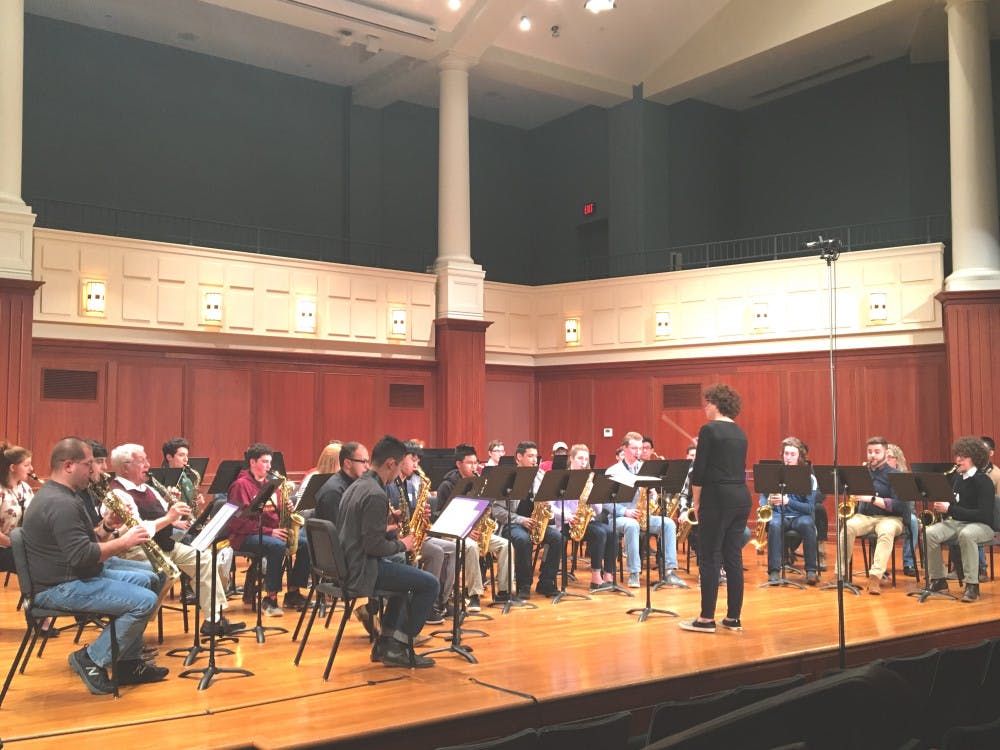By Garrett Cecere
Managing Editor
Mayo Concert Hall was only briefly quiet on a cold Saturday morning before the sounds of saxophones gradually filled the building and performers eagerly warmed up for the music department’s saxophone summit. Whether they were young players or alumni from decades ago, every performer shared a common joy and love of music.
The event, held on Feb. 2, was the College’s second annual summit after the music program celebrated its 100th anniversary last year.
Kathy Mitchell, an adjunct music professor at the College, conducted the rehearsals, the master class and the final performance of the day in order to ensure the players were prepared for their performances.
“What we did this year was we opened it up to all ages and skill levels,” Mitchell said. “(We wanted) to provide an atmosphere where people were going to be excited about performing … but I think most of all, it was important to me to play really good music … and have quality music for a quality event.”

Music has been a major influence in Mitchell’s life and she has family members who are musicians as well. She heard her first classical saxophone piece in middle school and has since aspired to pass the same knowledge and talent that she gained from her own music teachers down to her students.
“I think the thing to note is that I had really amazing teachers, and I think that’s why I went into teaching”, Mitchell said. “But I really love performing, so that duality really works for me.”
Some of the performers included students and alumni of the College. Others were local high school students and some were middle school students.
The saxophones sounded like many different instruments playing together due to the variations in pitch. Some of the instruments, such as the soprano saxophones, were small, while others were nearly as tall as the players who held them.
During the summit’s master class session, Mitchell invited people to the stage to play songs of their choice while she gave them feedback on every aspect of their performance, from posture to breathing.
Mitchell also performed with several alumni, who were exhilarated to come back to the College for another performance.
Jason Verblaauw (’16), Michael Bareieri (’16) and Eddie Easse (’16) have enjoyed reuniting to play together after their graduation.
“We’ve been coming back for rehearsals since the summer,” Bareieri said. “Every other week in the summer, we’ll come down, use the building and practice.”
The trio played frequently while they were students at the College and the summit was another opportunity for a reunion.
“I absolutely loved it,” said Verblaauw. “The thing I really missed after graduating was playing in a quartet, especially with (Bareieri, Easse and Mitchell).”
Verblaauw is also a music teacher for the West Windsor-Plainsboro Regional School District. Some of his students were also performing at the event. Their attendance allowed them to showcase their talent and learn from the experienced players around them.
“They’re having a blast,” Verblaauw said.
During the finale recital, the students played a variety of songs, which ranged from Beethoven’s classic “Ode to Joy” to the modern composition, “Reflection for Saxophone Choir,” by alumnus John Bachalis (’68), who was the first saxophone major at the College.
“I majored on clarinet for two years, and then it really took me that long to persuade the woodwind teachers in the music department to allow me to major on saxophone,” Bachalis said.
Bachalis wrote “Reflection for Saxophone Choir” for the first saxophone summit last year, where seven players performed the piece. This year, there were 36.
“When I wrote (the piece), I wanted people to think how pretty the sax was,” Bachalis said. “A lot of the newer music is pretty far out, and I wanted something very accessible for an average audience.”
Bachalis went on to explain the origin of the composition and how he hoped the melodies throughout the piece would convey aspects of building a college such as planning, hiring and assembling many people to work and build relationships.
“In my head, I was thinking about the College,” he said. “I was thinking about the birth of an idea for an educational institution in the introduction.”
Bachalis played the accordion as a teenager before taking up the saxophone so he could play in the school band. Similar to Mitchell, he cited his teachers as major influences for him to devote his career to music and pass his knowledge on to future generations of musicians.
Mitchell acknowledged Bachalis before the final performance and gave him credit for convincing his professor and the dean many years ago that there should be a saxophone major.
“Somebody always has to go first,” Bachalis said while the crowd applauded.
As the players performed Bachalis’s piece, the final note faded out into a culmination of all that Bachalis hoped to achieve in composing for the summit.
“In the last part (of the composition), it’s sort of a sentimental look at all the good things that were accomplished over the years, the friendships that were formed, the encouragement for people to pursue more and more education, the good that those people did going out and teaching new generations,” Bachalis said.
As the final applause echoed through the hall, Mitchell was proud and thankful for the outcome and the work that all performers had poured into the summit.
“It was so awesome,” Mitchell said. “People just love it. It’s a blast.”
Mitchell also noted that she especially enjoyed how the younger performers realized that they could play the more challenging music.
Regardless of the performers’ ages, experience or musical background, each used music to come together, showcase their various musical talents and reunite with old friends.







